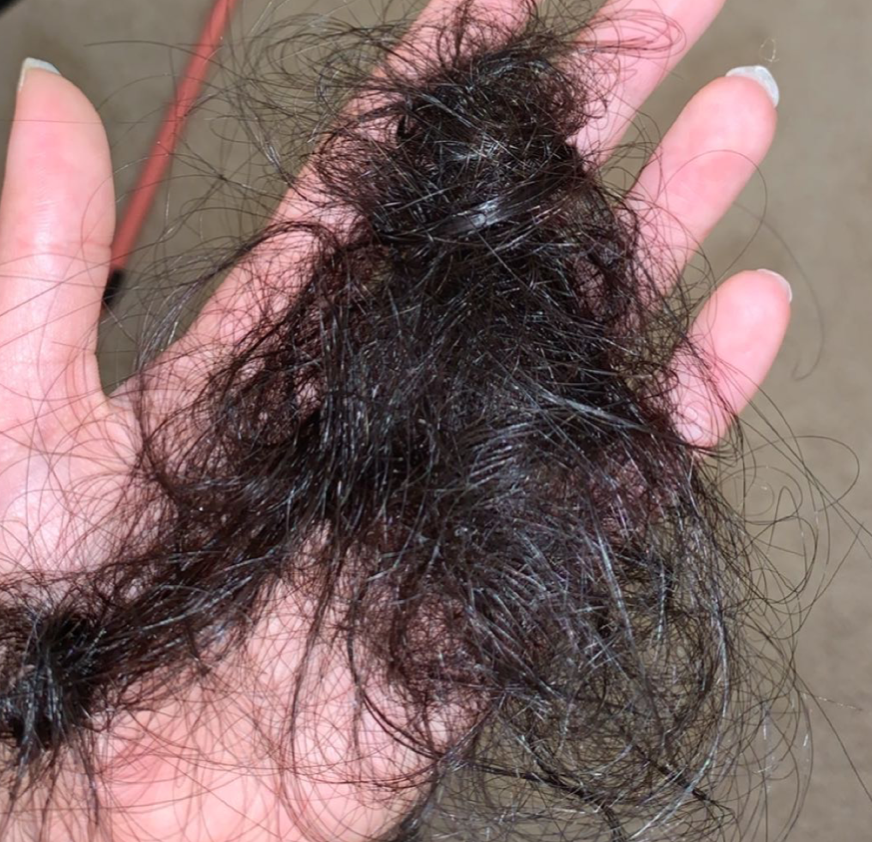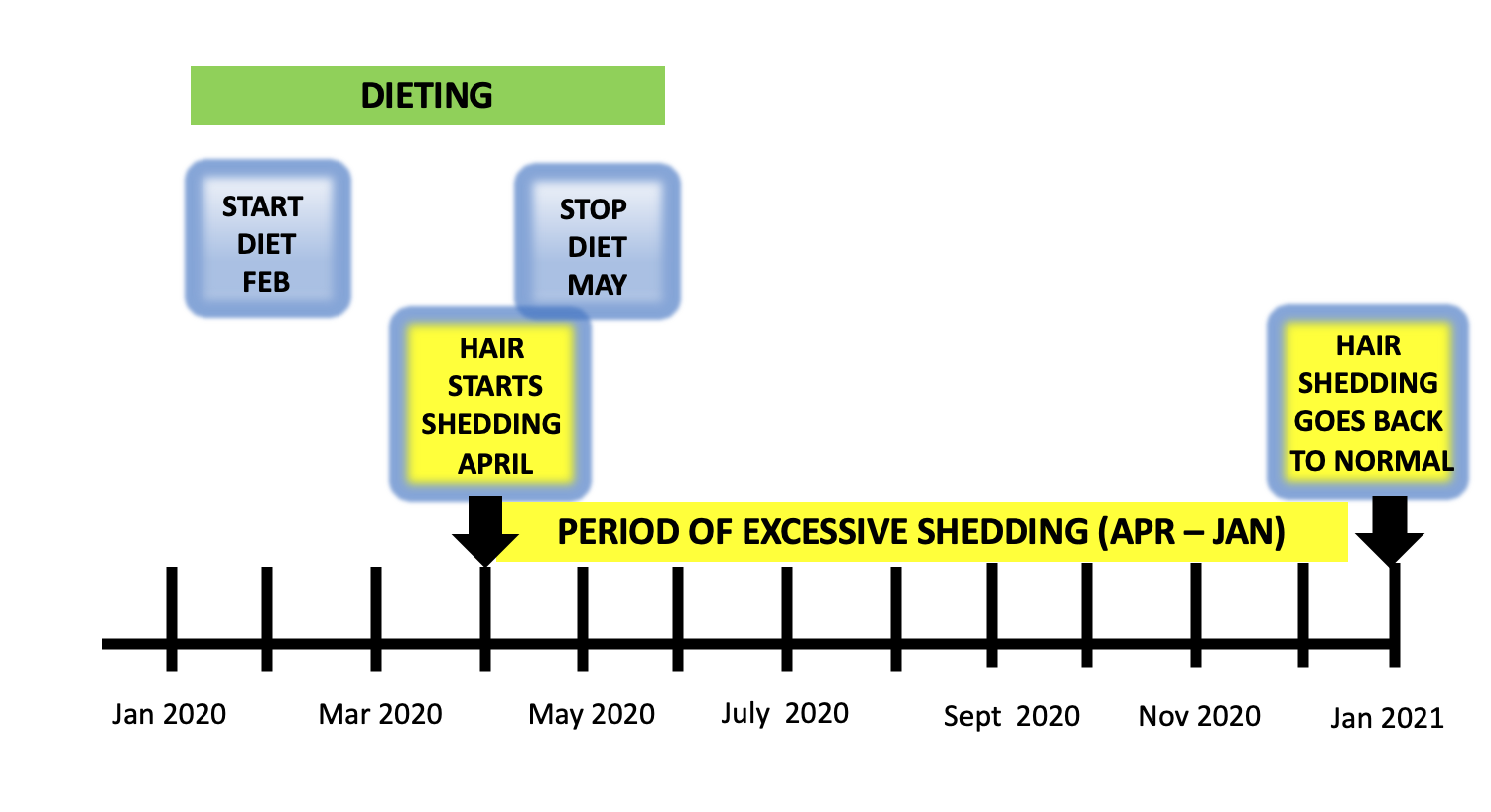Hair shedding after a low calorie diet
My diet is done but when is my hair shedding going to stop?
I’ve selected this question below for this week’s question of the week. It allows us to discuss some of the finer aspects of telogen effluvium from dieting.
Here is the question….
QUESTION
Hi! I have a quick question regarding my hair loss. For the past few months I have been on a very low calorie diet, and i’m now noticing a lot of my hair falling and thinning. I therefore changed my diet and am eating more calories now. But when will my hair stop falling? …. and is there anything i can do to stop it? I am a female 5’5, and weigh 123 pounds. I was consuming about 800-1,000 calories a day.. but burning about 500.
ANSWER
This is a terrific question. For most people, the answer is simple. For some, however, it’s a little more involved as we will see.
Before we go further, I’d like to point out that the ideal way to diagnose hair loss is using what I termed the ”Diagnostic S.E.T.” I refer to these as the diagnostic “set” because theses 3 aspects all go together. These 3 items include:
1) the patient’s Story
2) the findings uncovered during the process of the scalp Examination and
3) the results of relevant blood tests.
The first letter of each of the three words 1) story, 2) examination and 3) tests spell out the word “S.E.T.” - again a helpful reminder of how the information obtained from reviewing each of these 3 aspects helps solidify a proper diagnosis.
With that behind us, let's return to our question of the week again.
WHAT’S THE MOST LIKELY EXPLANATION?
First, it’s quite likely that you are experiencing what we term a “telogen effluvium” and in your case this is occurring from dieting. Anytime a person consumes less than 1300 calories per day the chances of telogen effluvium increase.
Telogen effluvium (TE) Is a hair shedding disorder whereby the patient experiences more daily hair loss than they may have in the past. Mild effluviums may lead to 50-100 hairs loss daily whereas more severe effluvium may be associated with several hundreds. Many forms of TE occur 2-3 months after a so called triggering event. A trigger in January, for example, causes hair loss in March. A trigger that occurs in March causes hair shedding in May. Common triggers include low iron, such as low iron, stress, thyroid abnormality, initiation (or cessation) of a new medication, or weight loss. Hundreds of other examples of triggers exist as well. In many cases a trigger cannot be found and the TE resolves on its own. Most telogen effluviums resolve about 9-12 months after the trigger has been completely corrected. Many patients with shedding disorders have scalp symptoms of itching, burning, tenderness, and feeling of something moving in the scalp. This is referred to as trichodynia.
Your story is quite typical for Telogen effluvium. Let’s suppose for the sake of this question that you started your diet in February. When would I expect you to start noticing shedding? The answer is April. How long will your shedding last? That answer is 6-9 months from the time that you started eating a normal 1500 calorie balanced nutritional diet AND provided your diet did not leave you with any nutritional deficiencies that keep you chronically depleted.
TYPICAL COURSE OF HAIR SHEDDING FOLLOWING A DIET
The typical course of hair shedding would follow something like this. Shedding would start 2 months after the diet and then worsen. In your case, I would not be surprised if shedding worsens in May and June and July even if the diet stopped in May. But over the course of the late summer and Fall, shedding should start reducing again and by the end of the year hair shedding should be back to ‘normal.’ It’s normal to shed 20-60 hairs per day and for some a bit more.
Your current weight tell me that your body mass index is now in a healthy range. Body mass index is something that I calculate for all my patients to get a sense of whether their weight is right for them. It’s not a perfect scale but gives a sense of where things should be Your BMI is 20.5 which is a healthy weight.
Does hair shedding always stop people who go back to eating a normal amount of calories?
For most people, shedding goes back to normal in a few months of eating a healthy number of calories. For some people however, that’s not the case. There are several reasons why shedding does not slow down including.
1. There were deficiencies created by the diet which have not been corrected.
A diet can create all sorts of deficiencies in vitamins and minerals. We only need small amounts of most vitamins and minerals anyways so once a health diet resumes, most people can make up for any losses and the body will absorb what it needs. However, for some people levels of vitamins and minerals don’t get replenished like they need to be. A good vitamin and mineral supplement can help but I often recommend testing potential deficiencies like iron, zinc, selenium, magnesium, B12, vitamin A, folate, vitamin D in addition to the usual tests for anyone with hair loss (CBC and TSH).
2. There are other reasons for the shedding which were forgotten about.
It’s possible for a person to shed because of diet. But sometimes a person can think they are shedding from a diet but that’s not really the reason they are shedding at all! Shedding can happen from over 100 causes so a broad approach is needed.
See Top 10 Causes of Telogen Effluvium
Thyroid abnormalities, stress, medications, illnesses in the body can cause shedding. In addition, many conditions mimic telogen effluvium and so the patient is actually shedding from a completely different condition such as alopecia areata incognito or a type of scarring alopecia.
3. The shedding has precipitated or ‘unmasked’ an andogenetic alopecia
For some people who shed, the process of shedding uncovers their slightest tendency to develop androgenetic alopecia. If a person has the underlying predisposition to develop genetic hair loss, then a shedding episode from telogen effluvium can cause the adnrogenetic alopecia to be set in motion. Even though the person’s telogen effluvium from the diet ends - they are faced with a new hair issue - androgenetic alopecia.
See Why Won’t My Shedding Stop?
Telogen Effluvium: Why is my density not returning to normal?
4. The patient has developed a chronic shedding issue.
Finally, some patients with shedding develop chronic shedding problems even though the original trigger has been identified, corrected and is long behind them. This is known as a form of chronic telogen effluvium
FINAL SUMMARY
Thanks again for the great question. I’d encourage you to see your dermatologist if the shedding does not improve. For most with shedding problems that come after dieting, the shedding gets worse for a few months and then progressively gets better and better until shedding rates go back to normal in 6-9 months. In some people though, this is not the story, and issues like androgenetic alopecia, chronic nutritional deficiencies, and other hair issues like chronic telogen effluvium need to be explored in greater detail.



